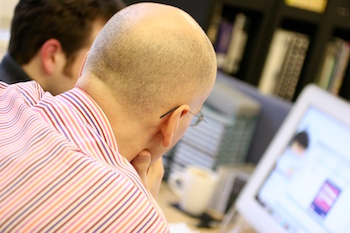SmartLogic is always looking for smart developers to join our team. As part of the interview process, applicants are asked to show off their skills in a technical interview. We’ve put together some advice from our developers on how to do well in any developer interview.
Previously we’ve discussed how to find job openings and how to prepare for interviews.
Show What You Can Do
A proper interview for a developer job will include a test of your technical skills, but being put on the spot can be stressful. Most of our team says that they didn't perform perfectly in the technical interview for their current job, so you shouldn’t expect that of yourself either.
Developer Travis Poulsen says his technical interview was less than ideal, but we love working with him now, so it all worked out!

“In my technical interview I was asked to develop a blog. Earlier in the day, I updated my text editor. As a part of the update, some keybindings changed, and in the interview I couldn't remember how they had changed. This caused my file and project navigation to take twice as long as usual,” he said. “To further complicate things, the database that I had set up in advance to save time refused to connect to the application. I can't speak to how the interviewer saw things going, but with the nerves inherent to an interviewee, the first five minutes of things not working felt like an eternity. I thought that would be it. The interviewer helpfully suggested trying a different database instead of spending the whole interview troubleshooting, so I readjusted and really got to work on the project. Things went a lot better from there.”
Having an open dialogue with the interviewer instead of keeping your head down will always make an interview better. Dan Ivovich, our director of Development Operations, said he felt intimidated at his interview, and that it was hard to get a sense of how things were going.
“Looking back, I wish I'd been more open and conversational about what I was thinking, to show my thought process more and be more collaborative,” he said.
A good technical interview accomplishes two things: It lets the company learn about you, but it also lets you learn about the company in a more realistic setting.
Ask Questions
“Ask a lot of questions in the interview. As much as you are being interviewed to work a the company, you should also be interviewing them to make sure that it is a place where you want to work,” Travis said.
He added that the interview will be smoother and more enjoyable as a conversation, as opposed to an interrogation. Developer Giancarlo Bautista said the conversational style of his interview at SmartLogic showed him what working at the company would really be like.
“I really appreciated the interview process at SmartLogic because it was realistic. I wrote code to build a tiny blog from scratch with my interviewer, and it was collaborative for the most part,” he said. “This closely mimicked a normal day between two SmartLogic developers who utilize pair programming. Too often you see interviewers killing the interviewees with impractical questions that are irrelevant to the job itself.”
Those impractical questions and high-pressure environment once got the best of Dan at an interview for a job he didn’t take.
“I had an interview with a few people from the company, and they wanted me to find an error in the code I was looking at. I couldn't get over the syntax and variable names and didn't see what they were looking for,” he said. “The issue they wanted me to find was very hard to see without understanding the context of the code snippet, and the room full of people waiting for me to respond was intimidating and demeaning.”
He now encourages interviewees to be confident and unafraid to ask questions if they need help.
“Don't try and talk your way out of things. Be honest with yourself and the interviewer about what you don't know. Show that you want to learn and are motivated,” Dan said. “If you aren't, then this isn't the right job for you.”
Live in Baltimore and want to work for SmartLogic? We’ll be at Technical.ly’s NET/WORK, the technology job fair, this Wednesday at the Baltimore Museum of Industry. Come by, meet some of the team, and drop off your resume.
If you’re looking to hire a developer, we can help you with that too:
How to conduct a developer interview
How to find good developers to hire
Follow SmartLogic on Twitter to hear more from our development team.


